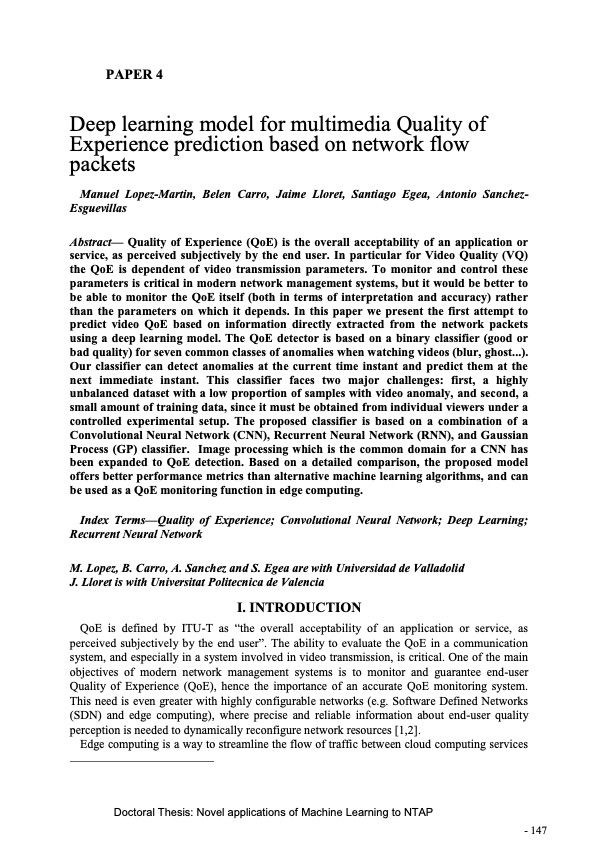
PDF Publication Title:
Text from PDF Page: 149
PAPER 4 Deep learning model for multimedia Quality of Experience prediction based on network flow packets Manuel Lopez-Martin, Belen Carro, Jaime Lloret, Santiago Egea, Antonio Sanchez- Esguevillas Abstract— Quality of Experience (QoE) is the overall acceptability of an application or service, as perceived subjectively by the end user. In particular for Video Quality (VQ) the QoE is dependent of video transmission parameters. To monitor and control these parameters is critical in modern network management systems, but it would be better to be able to monitor the QoE itself (both in terms of interpretation and accuracy) rather than the parameters on which it depends. In this paper we present the first attempt to predict video QoE based on information directly extracted from the network packets using a deep learning model. The QoE detector is based on a binary classifier (good or bad quality) for seven common classes of anomalies when watching videos (blur, ghost...). Our classifier can detect anomalies at the current time instant and predict them at the next immediate instant. This classifier faces two major challenges: first, a highly unbalanced dataset with a low proportion of samples with video anomaly, and second, a small amount of training data, since it must be obtained from individual viewers under a controlled experimental setup. The proposed classifier is based on a combination of a Convolutional Neural Network (CNN), Recurrent Neural Network (RNN), and Gaussian Process (GP) classifier. Image processing which is the common domain for a CNN has been expanded to QoE detection. Based on a detailed comparison, the proposed model offers better performance metrics than alternative machine learning algorithms, and can be used as a QoE monitoring function in edge computing. Index Terms—Quality of Experience; Convolutional Neural Network; Deep Learning; Recurrent Neural Network M. Lopez, B. Carro, A. Sanchez and S. Egea are with Universidad de Valladolid J. Lloret is with Universitat Politecnica de Valencia I. INTRODUCTION QoE is defined by ITU-T as “the overall acceptability of an application or service, as perceived subjectively by the end user”. The ability to evaluate the QoE in a communication system, and especially in a system involved in video transmission, is critical. One of the main objectives of modern network management systems is to monitor and guarantee end-user Quality of Experience (QoE), hence the importance of an accurate QoE monitoring system. This need is even greater with highly configurable networks (e.g. Software Defined Networks (SDN) and edge computing), where precise and reliable information about end-user quality perception is needed to dynamically reconfigure network resources [1,2]. Edge computing is a way to streamline the flow of traffic between cloud computing services Doctoral Thesis: Novel applications of Machine Learning to NTAP - 147PDF Image | Novel applications of Machine Learning to Network Traffic Analysis

PDF Search Title:
Novel applications of Machine Learning to Network Traffic AnalysisOriginal File Name Searched:
456453_1175348.pdfDIY PDF Search: Google It | Yahoo | Bing
Cruise Ship Reviews | Luxury Resort | Jet | Yacht | and Travel Tech More Info
Cruising Review Topics and Articles More Info
Software based on Filemaker for the travel industry More Info
The Burgenstock Resort: Reviews on CruisingReview website... More Info
Resort Reviews: World Class resorts... More Info
The Riffelalp Resort: Reviews on CruisingReview website... More Info
| CONTACT TEL: 608-238-6001 Email: greg@cruisingreview.com | RSS | AMP |